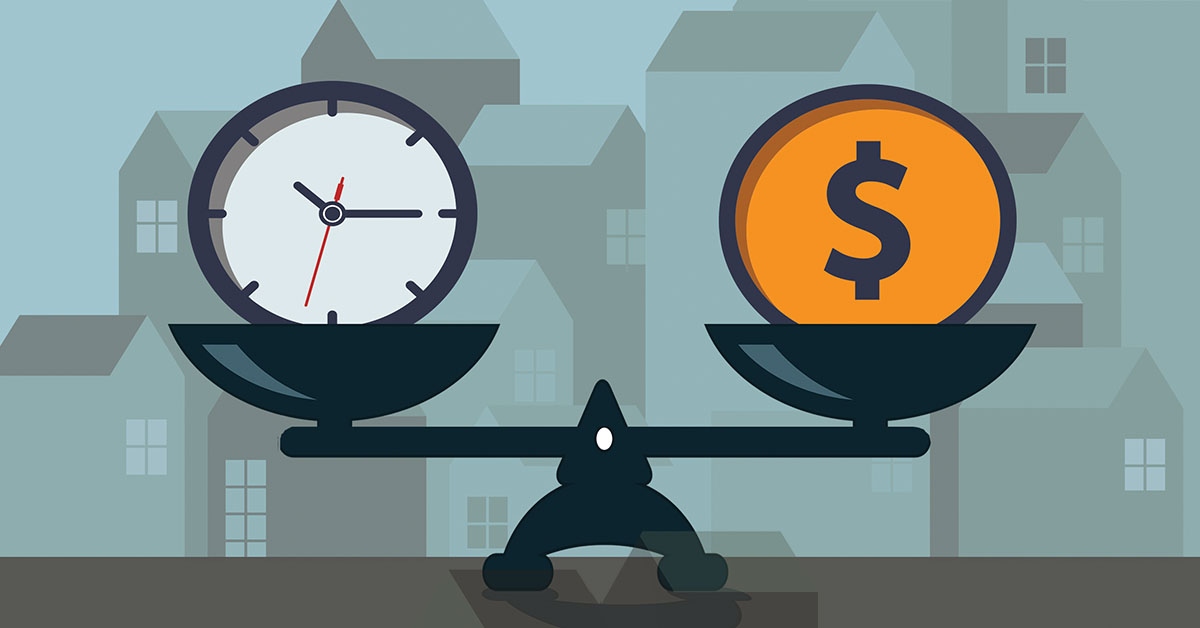Categories
Home Buying, Financial Planning, Real Estate AdvicePublished May 17, 2025
The True Cost of Waiting in Real Estate: Market Timing vs. Life Timing

In my years as a real estate professional, I've witnessed countless clients wrestling with the same fundamental question: "Is now the right time to buy or sell?" This hesitation often stems from trying to perfectly time the market – waiting for interest rates to drop, prices to fall, or inventory to increase. But what many fail to consider is the significant cost of waiting.
The Market Timing Myth
Many buyers and sellers believe they can outsmart the market by waiting for the "perfect" conditions. They watch interest rates, track inventory levels, and analyze price trends, hoping to pinpoint the ideal moment to make their move.
But here's the reality: even the most seasoned economists struggle to predict real estate market shifts with precision. The market doesn't follow a predictable pattern, and waiting for perfect conditions often means missing valuable opportunities.
The Real Cost of Waiting for Buyers
Let's examine what waiting actually costs buyers in today's market:
1. Price Appreciation Continues
In California, the Association of Realtors has predicted a 4.6% rise in median home prices for this year. For an $800,000 property, that's $40,000 in additional cost just by waiting one year. This compounds over time – the same house could cost significantly more in just a few years.
2. Lost Equity Building Opportunity
Every month you wait is another month you're not building equity. Instead of paying rent (which builds someone else's wealth), you could be making mortgage payments that contribute to your own net worth.
3. Missed Tax Benefits
Homeownership comes with substantial tax advantages that renters simply don't receive. These include deductions for mortgage interest and property taxes that can significantly reduce your annual tax burden.
4. Rising Interest Rates Risk
While rates may fluctuate, there's always the risk they could rise. Even a small increase in interest rates can dramatically impact your purchasing power and monthly payment.
The Real Cost of Waiting for Sellers
Sellers face their own set of costs when delaying:
1. Missed Opportunity to Upgrade
If you're selling to move up to a larger home, remember that while your current home appreciates, so does your target home – often at a faster rate because of its higher value. The gap between what you sell for and what you'll buy continues to widen.
2. Days on Market Impact
As inventory levels change, the longer you wait, the more competition you might face. More days on market often lead to price reductions and lower final sale prices.
3. Life Transitions Delayed
Many sellers delay listing because of market conditions, but this means postponing important life transitions – whether it's downsizing for retirement, relocating for a job, or accommodating a growing family.
Life Timing vs. Market Timing
The most successful real estate decisions I've witnessed weren't based on perfect market timing but on life timing. When clients align their real estate moves with their life needs, they typically experience greater satisfaction with their decisions, regardless of market conditions.
Consider these life timing factors:
- Family needs: Growing families, empty nesters, or caring for aging parents
- Career opportunities: Job relocations, promotions, or career changes
- Financial milestones: Inheritance, investment maturity, or retirement
- Lifestyle changes: Desire for different amenities, communities, or housing types
The Conversation to Have With Yourself
Instead of asking "Is this the perfect market?", consider these questions:
- What would improving my housing situation do for my quality of life?
- How would waiting another year affect my long-term financial goals?
- What opportunities might I miss by delaying this decision?
- If I look back in five years, will I regret not having made this move sooner?
Finding Balance: A Strategic Approach
The wisest approach combines awareness of market conditions with your personal life timing:
- Get pre-approved if you're buying to understand your current purchasing power
- Consult with professionals about realistic market expectations
- Calculate the actual cost of waiting in your specific situation
- Consider creative solutions like rate buy-downs or seller concessions
- Remember that refinancing is always an option when rates improve
Conclusion
The perfect time to buy or sell real estate isn't when the market reaches some ideal condition – it's when the move makes sense for your life. While market conditions are important considerations, they shouldn't overshadow your personal needs and long-term goals.
As I often tell my clients, when people reflect on their real estate decisions decades later, very few say, "I wish I had waited longer to buy my home." Instead, the most common regret is not having bought sooner.
The true cost of waiting isn't just measured in dollars – it's measured in delayed dreams, postponed plans, and missed opportunities to build the life you want.





